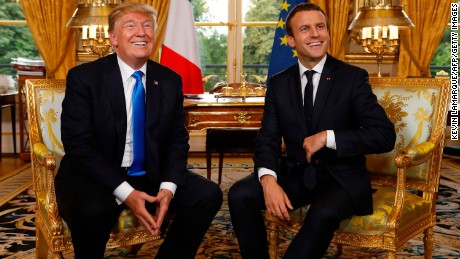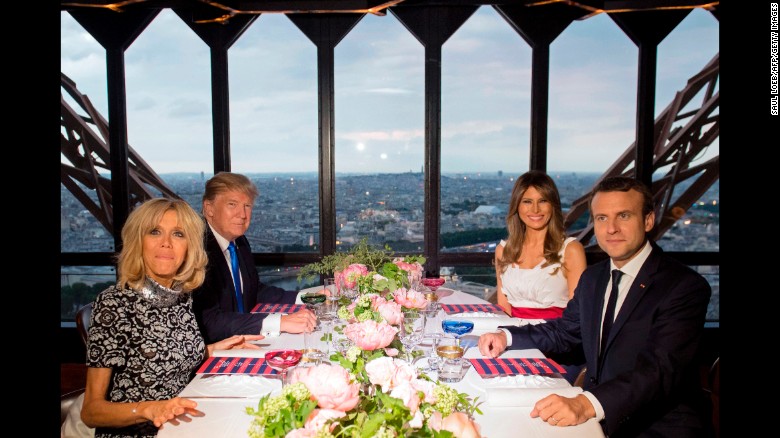
Paris – President Donald Trump offered a staunch defense of his eldest son Thursday, saying during a carefully worded response here that Donald Trump Jr.’s meeting with a Russian lawyer was a standard session that any political operative would have taken.
“My son is a wonderful young man. He took a meeting with a Russian lawyer, not a government lawyer, but a Russian lawyer,” he said alongside French President Emmanuel Macron at the ornate Élysée Palace. “It was a short meeting. It was a meeting that went very, very quickly, very fast.”
According to the emails released by Trump Jr. this week, the lawyer — Natalia Veselnitskaya — was described to Trump’s son in an email as a “Russian government lawyer” with information that was part of the country’s effort to help elect his father.
Trump didn’t make any note of the contents of those emails Thursday during his uncharacteristically practiced answer. Instead, he acknowledged that politics can be a sometimes-unsavory business where damaging information changes hands often.
“I think from a practical standpoint most people would have taken that meeting,” Trump said. “Politics isn’t the nicest business in the world, but it’s very standard.”
Trump’s answer came after several days of swirling controversy over the meeting, which was first revealed last weekend. Trump’s visit to Paris acted as something of an interlude from the cloud, though he had clearly prepared himself to answer a question about the matter during his joint appearance with Macron.
His dismissal of the topic came the same day the Republican and Democratic chairmen of the Senate Judiciary committee requested Trump Jr. testify before their panel about the episode. And it came a day after his pick to become FBI director, Christopher Wray, told lawmakers the meeting should have raised red flags.
Trump characterized the session Thursday as fruitless, and downplayed the role of the other two participants in the meeting, son-in-law Jared Kushner and then-campaign chairman Paul Manafort.
“One of them left almost immediately and the other one was not really focused on the meeting,” Trump said, without naming Kushner or Manafort.
Trump said “nothing happened from the meeting,” and insisted that Trump Jr. had committed no wrongdoing. “Honestly, I think the press made a very big deal out of something really a lot of people would do,” Trump said, though he avoided calling the situation “fake news” and, atypically, didn’t question the validity of the reporting surrounding the meeting.
Trump and Macron took questions after sitting for extended talks on security matters, including the civil war in Syria and counterterrorism efforts. Trump is here on a pomp-filled celebration of transatlantic ties at a time of anxiety on both continents.
He was treated to a grand display of French splendor in the courtyard of Les Invalides military complex earlier in the day: a brass band to play the national anthem, a full review of troops, a warm handshake from Macron, France’s charismatic new leader and a European double kiss from Macron’s wife, Brigitte.
He was also led on a tour of France’s national military museum and Napoleon’s tomb at Les Invalides.
Macron, who was elected decisively in May and bolstered by legislative successes for his new political party, views himself as a bridge between Europe and the United States, his advisers have said. Rather than isolate Trump, Macron hopes to keep the US leader within the fold of other western democracies.
Macron appears uniquely positioned to assume the role of Europe’s primary interlocutor with Trump. Unlike German Chancellor Angela Merkel, who faces reelection in September, or British Prime Minister Theresa May, who was dealt a political blow in last month’s snap election, Macron is unencumbered by looming political baggage that would distract from a close relationship with the US president.
But while both men exude alpha-male tendencies, their differences are readily apparent. At 39, Macron is the youngest French President in modern times; the 71-year-old Trump is the oldest elected US President in history.
Macron is eager to develop close security ties with Trump, but in other areas he’s already emerged as a vocal critic, most notably over Trump’s withdrawal from the climate accord that bears the French capital’s name.
Trump maintained an openness to renegotiating the accord Thursday, but maintained a nonchalance about reentering the United States into the pact.
“Something could happen with respect to the Paris Accord. We’ll see what happens,” he said. “If it happens, that’ll be wonderful. And if it doesn’t, that’ll be OK too.”

For his part, Macron said he remained committed to the climate agreement, and would continue urging Trump to reconsider.
“I think that it is important that we can continue to talk about it,” he said through a translator.
Trump’s stop in Paris is designed to mark the 100th anniversary of the United States’ entry into World War I, and the security theme will carry over in talks between the leaders, which the White House said would center on Syria and counterterrorism efforts.
Macron hopes to demonstrate to Trump the willingness of France to play a broader role in global security affairs. The country is the second largest contributor to the US-led anti-ISIS coalition, a permanent member of the UN Security Council, and a key actor in counterterrorism efforts in northern Africa.
Trump on Thursday praised the “tremendous progress” in Iraq as represented by the retaking of Mosul, but warned that gains must not be lost.
“We must work with the government of Iraq to consolidate the gains and ensure the victory stays a victory, unlike last time,” he said during the joint news conference.
And he said the US and France face “grave threats from terrorist organizations that wage war on innocent lives,” but said the countries “stand united against these enemies of humanity.”
He made note of the one-year anniversary of the Nice terror attack, saying the US stands with France in its battle against extremism.
Trump has previously decried the security situation in Paris, lamenting that “Paris isn’t Paris any longer” — and suggesting the city had been overrun by extremists.
But he backed off those statements Thursday, saying instead that France would remain secure in Macron’s hands.
“It’s going to be just fine because you have a great president,” Trump said. “You have someone who’s going to run this country right.”
But he warned Macron that both their reputations are on the line.
“You’ve gotta do a good job, please, or you’re going to make me look bad,” he said.
As reported by CNN
